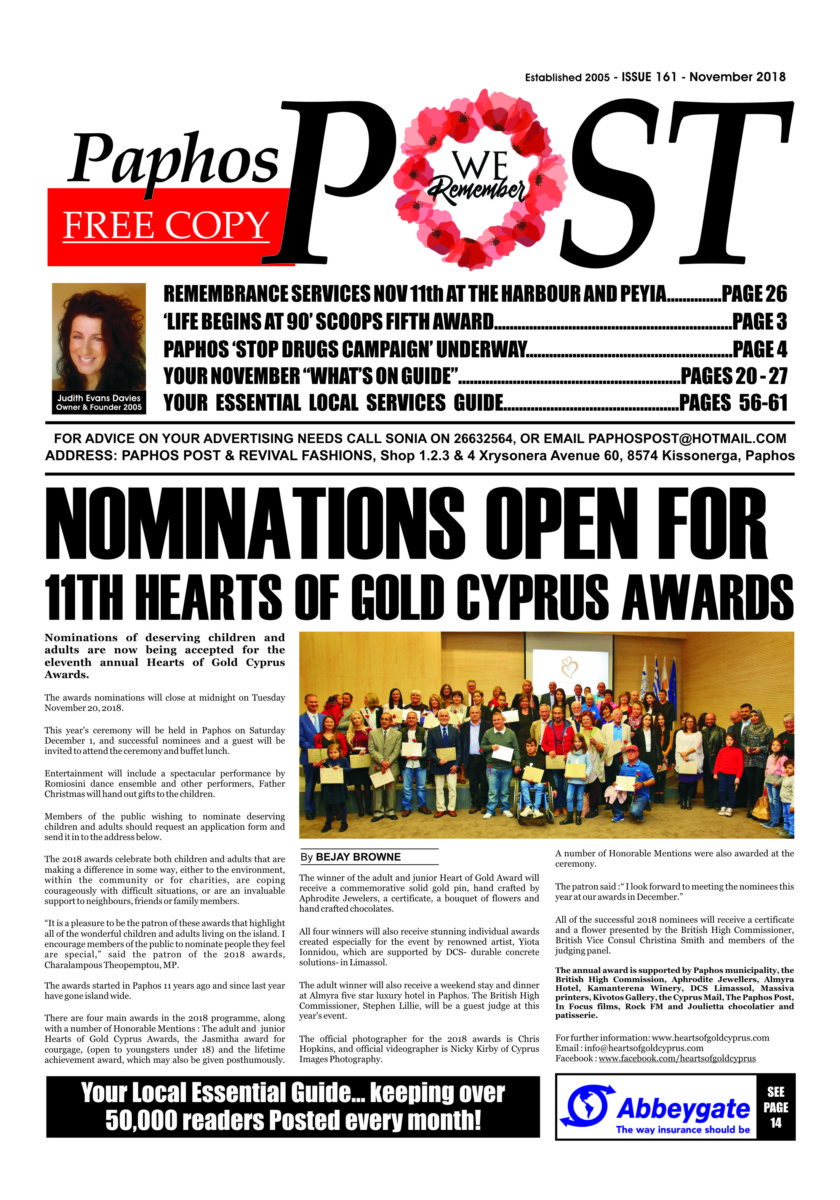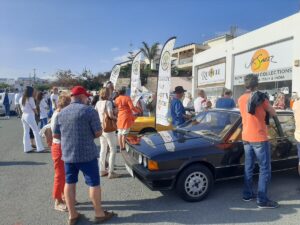NOMINATIONS OPEN FOR 11th HEARTS OF GOLD CYPRUS AWARDS
By Bejay Browne
Nominations of deserving children and adults are now being accepted for the eleventh annual Hearts of Gold Cyprus Awards.
The awards nominations will close at midnight on Tuesday November 20, 2018.
This year’s ceremony will be held in Paphos on Saturday December 1, and successful nominees and a guest will be invited to attend the ceremony and buffet lunch.
Entertainment will include a spectacular performance by Romiosini dance ensemble and other performers, Father Christmas will hand out gifts to the children.
Members of the public wishing to nominate deserving children and adults should request an application form and send it in to the address below.
The 2018 awards celebrate both children and adults that are making a difference in some way, either to the environment, within the community or for charities, are coping courageously with difficult situations, or are an invaluable support to neighbours, friends or family members.
“It is a pleasure to be the patron of these awards that highlight all of the wonderful children and adults living on the island. I encourage members of the public to nominate people they feel are special,” said the patron of the 2018 awards, Charalampous Theopemptou, MP.
The awards started in Paphos 11 years ago and since last year have gone island wide.
There are four main awards in the 2018 programme, along with a number of Honorable Mentions : The adult and junior Hearts of Gold Cyprus Awards, the Jasmitha award for courgage, (open to youngsters under 18) and the lifetime achievement award, which may also be given posthumously.
The winner of the adult and junior Heart of Gold Award will receive a commemorative solid gold pin, hand crafted by Aphrodite Jewelers, a certificate, a bouquet of flowers and hand crafted chocolates.
All four winners will also receive stunning individual awards created especially for the event by renowned artist, Yiota Ionnidou, which are supported by DCS- durable concrete solutions- in Limassol.
The adult winner will also receive a weekend stay and dinner at Almyra five star luxury hotel in Paphos. The British High Commissioner, Stephen Lillie, will be a guest judge at this year’s event.
The official photographer for the 2018 awards is Chris Hopkins, and official videographer is Nicky Kirby of Cyprus Images Photography.
A number of Honorable Mentions were also awarded at the ceremony.
The patron said: “I look forward to meeting the nominees this year at our awards in December.”
All of the successful 2018 nominees will receive a certificate and a flower presented by the British High Commissioner, British Vice Consul Christina Smith and members of the judging panel.
The annual award is supported by Paphos municipality, the British High Commission, Aphrodite Jewellers, Almyra Hotel, Kamanterena Winery, DCS Limassol, Massiva printers, Kivotos Gallery, the Cyprus Mail, The Paphos Post, In Focus films, Rock FM and Joulietta chocolatier and patisserie.
For further information: www.heartsofgoldcyprus.com
Email : info@heartsofgoldcyprus.com
Facebook : www.facebook.com/heartsofgoldcyprus/
STUNNING NEW SCULPTURE IN HEART OF PAPHOS OLD TOWN
By Bejay Browne
A new bronze sculpture created by Cypriot artist, Yiota Ioannidou, has been installed in a recently renovated square in Paphos old town.
With commanding views of the town below and the Mediterranean behind her, a bronze of a child now sits atop a cushion and plinth crafted in marble, holding a sparrow, with others perched beside her, under the branches of a recently-planted olive tree.
After the installation was completed, Ioannidou told the Paphos Post: “This is a very special square, its position is unique and I was looking for somewhere particular since my work is taking a direction of art in public spaces.”
‘The girl with a sparrow’ is the third work by the Paphos-born artist to be placed in the town, The Little Fisher Boy and Sol Alter, a homage to Aphrodite, attract hundreds of visitors every day. Another of her sculptures is found in Argaka and honours rural mothers.
Born in Paphos, Ioannidou studied at the School of Fine Arts in Athens, before returning to Paphos, which she loves.
The artist, whose art is her oxygen, she says, added that public art, such as this project, creates an energy in a space and connects the public looking at it, giving a sense of humanity and culture.
“I want people to talk to each other, to feel something when they see a sculpture and to bring families into spaces, to make our senses work, no matter what the subject is. This is the point of public art,” she said.
She added that her goal as an artist was not to decorate a space, but to make a subject speak to the soul of the people.
Ioannidou said that the title of the piece refers to the sparrow that has chosen to sit so carefully in the girl’s hand, as she gently holds it. She chose to include sparrows as an integral part of the piece as they fly freely, are not caged and are beautiful.
“When we see a child we see hope, the next generation and the future,” she added of the piece.
The upgraded square is part of a massive project which has seen millions of euros invested in the centre of Paphos’ old town.
The new tree was included in the artists project and replaces a huge ancient tree that was uprooted by terrible storms in the area last year, and couldn’t be saved.
“Olive trees are traditional, strong, part of our culture and embody peace,” she said.
The sculpture was made with the support of Paphos municipality and has taken the artist ten months to complete.
“I am very happy to see her completed and sitting in her place, I hope it speaks to people and brings them pleasure,” she said.
NEW BEACH PLANNED FOR CHLORAKAS
By Bejay Browne
The creation of a new beach, breakwaters and leisure facilities is earmarked for Chlorakas in Paphos, and at a cost of around €4 million, is being hailed as the most ambitious and important project for the area in more than a decade. The project will hopefully get underway next year, according to officials.
The beach will also be the first ‘organised and safe area’ for locals and tourists to enjoy, according to the local community leader, Nikolas Liasidis
Although there are a couple of small beaches in Chlorakas, such as Sandy Beach and Vrexi, this stretch of coastline is prone to huge waves, dangerous currents and a rocky shoreline, meaning it’s not always suitable for swimmers, Liasidis told the Paphos Post.
“It’s not easy to swim in Chlorakas and the project is a very important one for us as we don’t really have any safe beaches, although we have a beautiful 6km coastline”, he said.
“We are a tourist area and it is dangerous to swim, this is no good and we need to create a safe beach as soon as possible. It will benefit us economically and also be good for tourists and locals too, for our quality of life.”
The proposed beach will be in the area known locally as Alitzi, running between the Saint George Hotel and the Laura Hotel.
“It will run from in front of the Laura and be around 500m along stopping next to St George.”
The project consists of a number of stages.
Firstly, five breakwaters will be constructed in the sea to create a safe coastline for swimmers, said Liasides, noting that it’s proposed that the government will pay for up to 50 per cent of the cost and the remainder will come from the coffers of Chlorakas community council and the local hotels.
“We are negotiating now. It’s our opinion that the hotels and the community board together should pay 33 per cent and the government should pay more, at 67 per cent. The government has a different opinion, it’s a sticking point for us but we are negotiating, I am hopeful,” he said.
The local leader noted that the council has already secured all of the relevant licences, the final one was granted in May this year, which is from the environmental department.
The construction of new breakwaters is just one part of a three-point plan for the community board, explained Liasidis.
“The first point is the wave breakers, these are also important as it will help reclaim the sand to form a beach. This is our starting point.”
The second point of the plan is to build a restaurant and a large beach bar at the new beach, which will be able to cater to the entire area.
The third is to create a new access road and a parking area, the design of which has already begun with the civil engineers, he said.
The Chlorakas community board has already rented a piece of Turkish Cypriot land from the relevant authority – this happened four years ago- to create a parking area, he said.
The community board is planning to operate the 150 or so sunbeds and umbrellas at the new beach, which will allow them to make a good income and earn some money back.
The new, organised beach will have lifeguards on duty, and Liasidis is also committed to making disabled access easy. This will include a special chair and other equipment to help them in and out of the sea, he said.
As the proposed area is a large one, there will also be beach volley courts, showers, changing rooms, toilets and other facilities.
He hopes that the community board and hoteliers can reach an agreement with the government in 2018, so that plans can get underway at the end of next year.
PAPHOS ‘STOP DRUGS CAMPAIGN’ UNDERWAY
By Bejay Browne
The first of a series of anti-drugs seminars aimed at both parents and children took place in Paphos in collaboration with police.
“Two police officers from Nicosia’s drugs squad headquarters presented statistics and then members of the public, parents mostly, asked questions,” said organiser, Paphos Russian expat resident, Irina Yakimovitch.
The ‘Stop Drugs Campaign’ seminars are for both adults and children, and Yakimovitch said that the seminars are important as they will help to educate parents about what signs to look for that their children may be dabbling in drugs.
“Many parents I have spoken too, like me, have no idea of what drugs look, especially modern ones (some look like stickers), or what signs to be aware of, such as pieces of foil in their children’s pockets,” she said.
“The police say that crystal meth, for example, is very popular and we must all be aware; we don’t want to be too late.”
Ioanna Yiasemi of the Cyprus National Addictions Authority (CNAA), said that each year, eight to 10 people die in Cyprus from an overdose, mainly due to opioids.
A spokesman for Cyprus Drug Law Enforcement Unit told the Paphos Post that the most widespread drug is cannabis.
“The Drug Law Enforcement Unit in cooperation with Cyprus National Addictions Authority, take part in many campaigns relating to drug prevention and information,” he said.
The activist hopes that the coming seminars in schools will help students to think twice and reject taking drugs.
Similar anti-drugs seminars for students will be offered at government schools in the coming months, and may be arranged for any private school by request, she said.
The Drug Law Enforcement Unit has set up a 24 hour drug information and assistance helpline (1498), so that anyone wishing to provide information concerning drug-related crimes may do so in strict confidence.
Preliminary assistance in the form of initial guidance is also provided via the helpline for people seeking treatment for drug addiction.
The seminars will be in Greek, with both English and Russian translators available.
TENSION CAUSED BY CLOSURE OF AKAMAS ROAD
By Bejay Browne
A stretch of road in the Akamas national park where a Russian couple died after their car went off the edge of the cliff has been closed, causing contention in the area.
The local community leader Andreas Christodoulou told the Paphos Post that he had urged authorities back in September to take action to make the road safer before someone was seriously hurt or killed after around ten accidents, although no fatalities, had occurred over the summer.
But Agriculture Minister Costas Kadis said the government was looking to improve the road as part of the operation of the Akamas national park.
“It will be improved so that it is accessible to visitors’ vehicles and park vehicles because there will be significant changes on how one can move inside the park,” he said.
The two Russian nationals, a 58-year-old man and his 48-year-old wife, were killed when their rental car went off a cliff, and plunged around 30 metres below, close to the Baths of Aphrodite, a popular tourist attraction.
Christodoulou said that the entire stretch of road running from the Baths of Aphrodite to Fontana Amorosa and the edge of the Akamas – a length of around 7km – should be made safer. A motorcyclist plunged off the cliff in the same spot over the summer.
“It needs to be widened and a proper road surface added which is suitable for the environment,” Christodoulou said.
Following the latest accident, police and forestry department officials took the decision to close the road.
Local mayor Yiotis Papachristofi said he would meet local community leaders and other concerned bodies to discuss what action would be taken.
“We want the road to be fixed and reopened, it’s used by the public in a state park and it needs to be made safe. The decision to just close it is not correct,” he said.
“The state has left it for too long without fixing it and this has caused it to be more dangerous. For the last two years, no repairs have been carried out at all.”
The mayor said the road is utilised by locals working in the area and by lots of tourists visiting one of the region’s most popular spots and heading into the Akamas.
The dirt track is hazardous, narrow in places, much of which runs along the cliff edge and is full of twists and turns, but the views and the surrounding countryside are breath taking.
However, Andreas Evlavis of the Paphos Green party said the “road is not a registered road but a simple path and, as we have always said, it must be closed to the public and accessible only to the emergency services and vehicles of the forestry department”.
He added that although the track was gated and access not permitted up to about ten years ago the barrier was removed and the trail has since been used by unsuitable vehicles.
He noted that only four wheel drives can properly cope with the terrain.
“It has been a big risk for tourists and dangerous for them to use this track, no one cares,” he said.
LOCALS CONCERNED FOR FUTURE OF CORAL BAY
By Bejay Browne
The government’s decision to allow a 2005 appeal by Leptos developers to build next to blue-flagged Coral Bay is scandalous and overrules a town-planning decision, environmentalists and local Peyia officials said.
Leptos’ appeal concerns building 22 villas and services on a piece of land which sits above Coral Bay and has commanding views of the beach and Mediterranean sea and has recently been used as a car park.
Andreas Evlavis, secretary of the Paphos Green Party, told the Paphos Post that the government’s decision to effectively ignore the local plan and overrule the decision of town planning is a huge scandal.
“This will open the way for all developers to do what they want,” he said. “If this goes ahead, there will be buildings everywhere at Coral Bay and no place for visitors. The developer also wants to take over the operation of the two beach kiosks as part of the agreement on beach access, another big scandal for us.”
He added that the Green party fully support the efforts of the local mayor and the municipality not to give in to the demands of the developer.
Although unwilling to go into details because discussions with Peyia municipality are ongoing, developer George Leptos said that his aim is to enhance the area overall.
“The municipality knows our views and what we want to do in the area. We understand the importance of Coral Bay and the legal rights of the company, we would like to resolve this situation,” he said.
Leptos confirmed that the original application to develop Plot 1 – 22 villas and services, such as a restaurant – was made in 2005 and rejected by Paphos town planning.
However, in May, the government ministerial committee upheld the appeal, with stipulations. The Peyia mayor and his council only found out about it in September.
“Since 2005 we have been in long discussions and expressed our views. Our wish is to include facilities necessary for a public beach and to enhance the area overall,” said Leptos.
He added that comments made that there is no access to the beach after the development was built was not the case as there are four or five existing pathways leading from the road to the beach.
“There will be a minimum of six or seven ways of public access and we would like to reach an amicable solution to move ahead smoothly.”
Mayor of Peyia, Marinos Lambrou, said the Leptos application made in 2005 was rejected as provisions of the Paphos local plan and other legislation on public pathways and ravines were not met.
He said that when the original application was made, more building density was permitted, and since then the regulations have changed. This decision was overturned by the central government and not by town planning in Paphos, he added.
The mayor said that if such a development were allowed to go ahead, it would mean not only Coral Bay is finished, but Peyia too.
He noted that the developer has the right to develop the land, which has around fifty years left on a lease, but at 15-20 percent maximum and that 40 per cent also lies in the coastal protected zone.
“This is according to the laws which exist now, and with the approval of the planning authority.”
Peyia councillor Linda Leblanc noted :“Leptos also told us if we don’t make a deal, we should buy the land. This is my preference and one that has been refused by Leptos for many years,” she said.
“If he is serious, let’s get an appraisal, it’s in the public interest to do so.”











